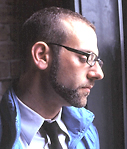The College Unions Poetry Slam Invitational, the nation’s premiere college-based poetry slam event, returns April 6-9 with competitions, educational workshops, panels and a documentary film showing.
“We like to call it the varsity sport of the soul,” says program chairman Robb Thibault, current director of the Hunt College Union at the State University of New York College at Oneonta. He organized the first national college unions Poetry Slam event in 2001 while employed at U-M’s University Unions.
“The participants are not only sharing a piece of themselves with the audience, but there is a growing poetry community on campus. They are building lifelong friends and also a network,” says Daniella Borum, program advisor with University Unions Arts and Programs and event organizer. She says students go on to perform professionally, or head workshops or teach poetry.
While six poetry slam teams representing seven colleges competed at U-M in the first invitational, 35 teams from colleges nationwide are scheduled to compete next month. Workshops and panels will be presented on topics related to organizing campus slam programs, writing, performing, publishing and studying poetry.

Coval
The championship round opens at 6 p.m. April 9 at the U-M Museum of Art, followed by an awards ceremony. Ticket information is available at the Michigan Union Ticket Office, 734-763-TKTS.
Other event highlights include: Kevin Coval, co-founder of “Louder Than a Bomb: The Chicago Teen Poetry Festival,” presenting his festival documentary at 2 p.m. April 9 in the Pierpont Commons East Room; and a program featuring Detroit poet Airea Dee Matthews and New York poet Mahogany Browne at 10 p.m. April 6 in the Michigan Union Rogel Ballroom.
Thibault says the poetry slam movement has its roots in the collegiate debate societies and literary clubs. “For some of the students it’s their connection to the campus. They often say it’s one of the most transformative experiences in their college life.
“Poetry slams bring together people who may not ordinarily share the same space. It’s a place where people can practice skill building and engagement. And it’s a place to go if you want to know what students are thinking about these days,” Thibault says.
Poetry slams feature poets performing their own works before an audience. They are judged on a numeric scale by randomly picked members of the audience. After a recent series of poetry slams at the University Club, four U-M team members and one alternate were chosen following a final grand slam competition.
Team member Gahl Liberzon, a senior in the School of Education from Ann Arbor, says his first poetry slam experience moved him to participate. “It was the first time I saw my generation talking seriously about things that mattered to them,” he says.
The poetry slam experience expands the way one views the world, Liberzon says. Successful poetry slam performers have to be exceptional writers and be willing to be vulnerable in public. “Sharing your own work, your own voice, is a really brave thing to do. Also, to be successful you have to respect your audience. That’s why poets memorize their work and think about how they’re going to perform it, and they’ll revise their work frequently,” he says.
Borum says a key appeal of poetry slams is they provide a safe place for students and others to express themselves in a very diverse community. “People have an opportunity to share their stories with one another, and the audience can relate to those stories across different ethnic and cultural backgrounds,” she says.
For more on poetry slam events, go to the University Unions website at umich.edu/~uuap/ or the Associaton of College Unions International website at acui.org/poetryslam.
Poetry Slam
When: April 6-9
Where: various locations
More information: umich.edu/~uuap

